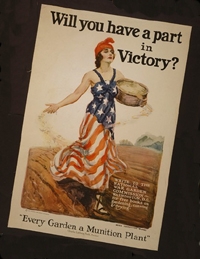
Our nation has many needs right now. Families are economically insecure. (This is an understatement). Communities are food-insecure. Obesity is epidemic; the figures on childhood obesity are particularly disturbing. We have a tenuous connection with the land and a poor understanding of our food system. Environmental concerns - and declining oil supplies - dictate a need to recreate more sustainable and local food systems. Despite the bad news, Americans have proven that they are hungry for change, eager to re-engage with their neighbors, their communities and their nation.
A revival of the successful national gardening programs (Victory Gardens) of the past is clearly occurring. Gardening and the local food movement are hot topics. And consider the USDA’s Peoples Garden Initiative (PGI), which was launched in 2009, on the biennial of Abraham Lincoln's birthday. (This was fitting: President Lincoln created the USDA and felt strongly that Americans needed to know how to cultivate land - even small parcels - to keep freedom secure).
The PGI is making good progress across the nation: there are now Peoples Gardens in every state. If encouraged and supported by us, the PGI could help in myriad ways. The infrastructure for the program is already in place. The educational materials that support school, home and community gardens are available through existing government agencies and private organizations. And, as I suggested to Agricultural Secretary Tom Vilsack via the Huffington Post, thousands of highly-trained volunteer Master Gardeners (who serve under the USDA’s umbrella, through land grant institutions) can be called upon to share their expertise with school, home and community gardeners.

Mr. President, we’re hungry for change (and a shameful number of Americans are just plain hungry). Sometimes to move forward, we must look back for inspiration. Certainly, the Victory Gardens of the past provide a wonderful example of what ordinary citizens can accomplish on the home front to respond to challenges in the larger world. The revival of a national Victory Garden campaign can provide the kind of change we can dig into, some good news we can all use right now.
I can’t miraculously create millions of jobs, or clean up the oil currently in the Gulf, but I can facilitate the small miracle of growing and providing fresh produce to my family, and perhaps sharing it with those who are experiencing hunger in my community. Please, Mr. President: Summon us to service.
Author - Emeritus - UCCE Advisor in Digital Communications in Food Systems & Extension Education; Editor, UC Food Observer; Food and Society Policy Fellow